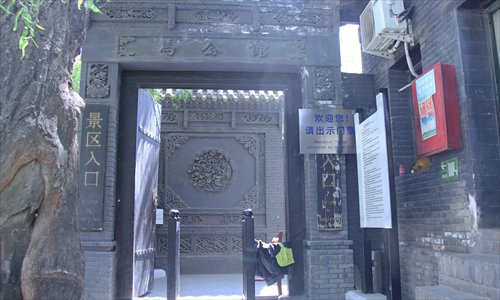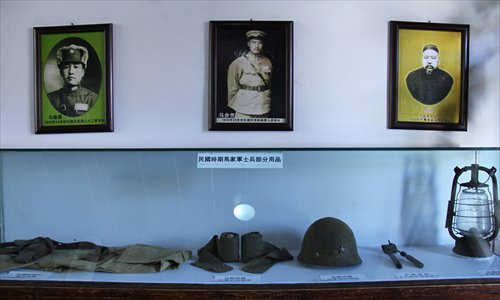Tourist site accused of distorting history by praising brutal warlord

The front gate of late Kuomintang general Ma Bufang's mansion. It is now a tourist attraction in Xining, Qinghai Province. Photo: IC

A photo of Ma Bufang (center) hangs in a room in the mansion. Photo: IC
The mansion of Muslim warlord Ma Bufang stands in Xining, Northwest China's Qinghai Province. The estate, which was built in 1942 and comprises over 290 houses which occupy over 6,000 square meters of a 30,000-square meter plot, is the country's only official residence in which jade is used as a major building material and is now a AAAA-rated tourist attraction.
However, the nationalist warlord, who died 41 years ago, has recently become a hot topic due to a Sina Weibo post from news portal guancha.cn which criticized the local authorities for failing to mention Ma's evil deeds anywhere at the attraction, triggering uproar among the public.
The outrage later escalated after Liang Xingyang, a Taoist priest and secretary-general of the Taoism Association of Xi'an in Northwest China's Shaanxi Province, was allegedly taken into custody by local police after accusing some people of "distorting" history by describing Ma - who tortured and killed Red Army soldiers and indulged in sensual pleasures - as a virtuous person.
The Qinghai provincial culture department responded on its official website on April 11, saying that the guancha.cn report has grabbed their attention, and their investigation showed that some tour guides have misled tourists with an "imprecise, random and one-side" profile of Ma.
The government statement said that local authorities have re-examined the captions and are working on rectifying the mansion's contents.
Although the caption disturbance seems to have come to a conclusion, discussions about how this happened and how the government should handle controversial historical topics continues.
A demon or angel?
According to a media reports, Ma, born in 1903, became the governor of Qinghai in 1938. In 1948, he was appointed deputy commander of the Northwest Army. Ma's family held power in Qinghai for 40 years and Ma was a cruel, violent and dissolute ruler, dubbed the "local tyrant."
The report said that Ma was one of a few Kuomintang officials who were shameless and licentious. He once said openly that "I will rape anyone except my mother and my children." He reportedly raped his subordinates' wives and daughters, his sisters, nieces, and brothers' wives. He even raped his granddaughter, later killing the baby she had.
A commentary published in the Jiefang Daily in June 2012 said that Ma killed 6,000 Red Army soldiers by burying them alive, pulling out their hearts, and cutting out their tongues. The commentary said that readers should "take a careful look at the mansion's introduction, Ma's acts were polished into good moves that benefited the country and the people. For example, he promoted education, banned drugs and protected the environment. He has no flaws and tourists marvel at Saint Ma!"
Another commentary written by popular author Liu Dian said that Chairman Mao hated Ma so badly that he ordered the destruction of Ma's army. Liu also mentioned that Ma's mansion shows him as a saint, adding that "No wonder people say that history is used for deception."
Over-polishing
"Developing Ma's mansion as a tourist attraction aims to let people know more about history. No matter whether Ma was a positive historical figure, his mansion is an important piece of tangible cultural heritage," Liu Simin, vice president of the China Society for Future Studies' tourism research institute, told the Global Times.
Liu added that it is possible that the local government tried to promote its tourism industry by exaggerating Ma's contributions, as people tend to visit celebrities' - especially heroes' - former residences. However, it is wrong to either hide his wrongdoings or over-polish his merits.
"Profiles should be comprehensive and objective and based on current mainstream scholarly opinions," Liu said.
Ma Yong, a research fellow with the Chinese Academy of Social Sciences, told the Global Times that people should respect others' views and feelings toward history and analysis of historical figures should be diversified.
"We should consider Han people's feelings, but also see his contributions to the development of western China," said Ma Yong.
Global Times
Newspaper headline: Tales of a tyrant